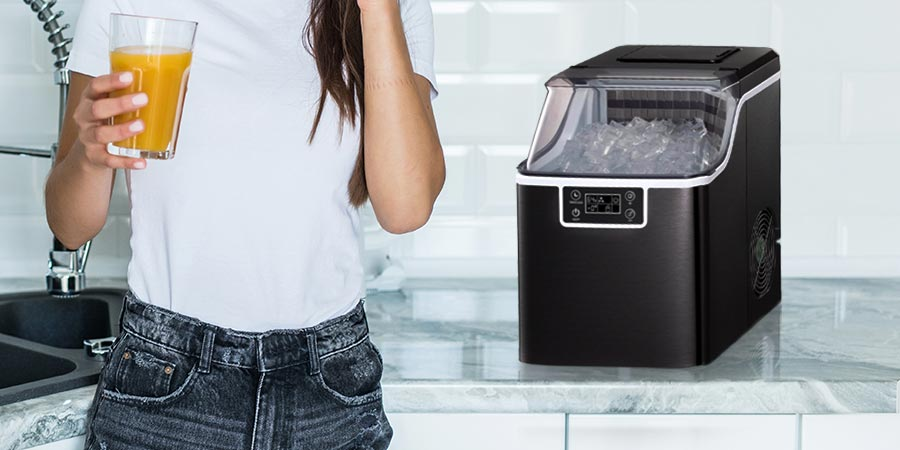A commercial ice machine is vital equipment in any restaurant or bar. It always guarantees enough ice to serve cold beverages and keep food fresh. However, like any machine, ice makers can face problems. Being aware of how to resolve these issues can save time and prevent disturbances. In this content, we'll check out some common issues of such products and how to address them.
Machine Not Producing Ice
One of the most common issues is when the commercial product stops producing ice altogether. This can happen for several reasons. First, review if the appliance is corectly plugged in and switched on. Also, see that the water supply is functioning and there is adequate water in the tank.
Specialised units that control temperature, humidity, and ventilation to create the ideal environment for aging meat. Browse our collection of Meat Aging Cabinets.
Another reason could be a clogged water filter. If the filter is dirty, water cannot flow properly, and the device will not make ice. Wipe or change the filter to restore ideal water flow.
If these methods don't work, you may be facing an issue with the equipment's internal parts. In this scenario, it's ideal to call a specialist for help.
Slow Ice Production
If your product is generating ice too slowly, it could showcase a few problems. First, check the room's temperature. These offerings work best in a cool environment. If the kitchen is too hot, it can slow down the production process. Try transferring the appliance to a cooler space if feasible.
Another reason for slow ice production could be dirty condenser coils. The condenser coils of the ice machines for sale remove heat from the machine, allowing it to make ice efficiently. If the coils are filthy, the device has to work more intensely, slowing down ice generation. Regularly maintain the coils to keep the equipment working smoothly.
Lastly, check the water supply. If the water pressure is too low, the device may fail to generate cubes The product may struggle to produce ice if the water pressure is too low. Confirm that the water supply is acceptable and there are no issues in the water line.
Ice is Too Small or Misshapen
If your cubes are generating in small sizes than normal or in odd dimensions, there may be an issue with the overall flow. Small or misshapen ice often indicates that the equipment isn't getting enough liquid. Review the water inlet valve to confirm that it is fully open and letting enough water to enter the device.
Another possible cause is a dirty evaporator plate. The evaporator plate is where formation of ice takes place. If it's filthy, the shape and size of the ice can be impacted. Clean the plate regularly to prevent build-up and ensure consistent ice quality.
Ice Has a Strange Taste or Smell
If customers start complaining about ice that tastes or smells funny, it's a sign that something is wrong. The most likely cause is dirty water or a dirty appliance. Start by checking the fluid filter. If you haven't changed it in a while, it may be letting impurities into the ice.
Besides, bacteria or mould can collect inside the device, impacting the flavour of the item. Thoroughly clean the interior of the commercial equipment, including the tank and storage bin. Use a food-safe cleaner to eliminate any bacteria or mould.
Lastly, confirm that the provided supply is pure and free of impurities. A contaminated & polluted source will impact the quality of the item.
Ice Machine Leaking Water
The leaks around the ice machines in Australia are a serious issue. They can ruin the floor and nearby equipment. If you notice significant pooling around the appliance, there are a few things to check.
Keep your ingredients chilled and accessible with easy-to-reach equipment. Check out our Lowboy/Drawer Refrigerated Benches.
First, inspect the pipe supply line. If the line is ruined or not perfectly connected, it can result in leaks. Tighten any loose lines or change damaged connections.
Next, check the liquid inlet valve. If the valve is faulty, the liquid can overflow and spread out of the appliance. A specialist may have to change the valve if it's faulty.
Finally, inspect the drain line. If the drain is clogged or blocked, the fluid will not flow out of the machine properly, leading to leaks. Avoid further problems by removing any obstructions.
Machine Freezing Over
If your product freezes over, it can cause major problems. When ice builds up inside the model, it can prevent new ice from forming. A few distinct attributes can result in freezing over.
First, check the temperature settings. If the device is set too cold, it can cause excessive ice build-up. You must avoid freezing by modifying the temperature to a slightly hotter setting.
Next, inspect the air filters. If they are choked, they can hinder airflow and result in freezing of the equipment. Regularly clean or change the purifiers to ensure proper ventilation.
Another potential cause is a malfunctioning thermostat. If the thermostat is not working correctly, it may cause the machine to run too cold. In this scenario, a repairperson may have to change the defective thermostat.
The Machine is Making Strange Noises
Ice machines near me typically make some noise while operating, but loud or unusual noises can indicate a problem. Grinding, banging, or rattling sounds are signs of mechanical issues.
One common cause of loud noises is a loose component. Look for any loose screws or components in the offering and tighten them if required.
Another reason could be a worn-out fan motor. If the fan motor is old or damaged, it can create loud noises. In this scenario, you may have to resolve the problem by changing the fan motor.
If the sound continues, it's ideal to call a repairperson to check the device and resolve any underlying issues.
Ice Machine Keeps Shutting Off
If your titular product keeps shutting off, it can be annoying and result in disruptions in your business. One common reason for this is an electrical issue. Look at the electricity supply and ensure the device is properly plugged in. Also, make sure there are no issues with the circuit breaker.
Another cause could be an overheating issue. If the product is overheating, it will shut off automatically to prevent damage. To prevent overheating, make sure the condenser coils are clean and that the machine is placed in a well-ventilated area.
Lastly, check the liquid supply. If the equipment is not getting enough water, it may shut off. Ensure that the line is open and the pressure is adequate.
Device Producing Cloudy Ice
Cloudy ice can be unappealing to customers, and it usually indicates a problem with the overall quality. If the water is hard or contains impurities, it can cause cloudy ice.
Start by checking the liquid filter. If it is old or clogged, it may not effectively remove impurities from the fluid. Replace the filter to ensure clean, clear ice.
Additionally, make sure the liquid temperature is not too high. Hot water can cause cloudy ice. Lower the fluid temperature to improve the clarity of the ice.
Increase your storage and preserve adequate airflow in your freezer space. Check out our Freezer Room Shelving options.
Conclusion
Commercial ice machines are crucial in any kitchen but are not without problems. Being knowledgeable about the ways to troubleshoot common issues can keep your ice machine running smoothly and avoid disruptions. From slow ice production to strange noises, addressing these problems quickly can prevent more significant issues down the line. Frequent upkeep, cleaning, and checks are crucial to ensuring your commercial appliance operates efficiently and produces high-quality ice for your customers.






